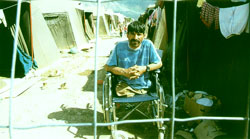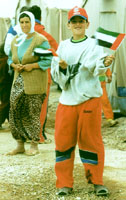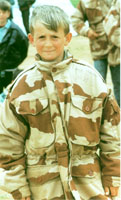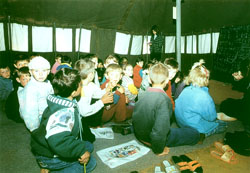UAE allieves suffering in Kosovo
The Kosovo crisis has shocked the world, but as David Williams found out, the UAE has played a major role in trying to relieve the suffering of its people
 The world has been united in horror in recent months as the plight of the Kosovars has dominated news programmes across the globe.
The world has been united in horror in recent months as the plight of the Kosovars has dominated news programmes across the globe.
Television pictures and newspaper front pages have shown images of families torn apart and thrown from their homeland by a ruthless Serb regime intent on ridding Kosovo of all its ethnic Albanians.
Behind the tears and tired faces of the one million refugees are chilling stories of torture, rape and murder. Wives, mothers and daughters have seen the men in their families either shot before their own eyes or put in shackles and taken away for a fate unknown - these grizzly tales have become almost monotonous in a macabre way.
While the military might of NATO has intervened to try and halt, or reverse, the so called ethnic cleansing, other countries outside of the North Atlantic Treaty Organisation have acted quickly to ensure the Kosovars' misery does not continue once they have crossed the sanctuary of the border.
One of those countries is the United Arab Emirates, which has made extraordinary efforts to relieve the suffering of the refugees spilling out of their own poverty-stricken country and into the poorest country in Europe, Albania.
Without the need to be asked, and without international interference, the UAE launched its mercy bid almost as soon as the first weary Kosovars trickled across the border, and it has since spearheaded one of the biggest success stories amidst a situation which has brought so much grief and sorrow.
The suffering touched the country's President, His Highness Sheikh Zayed bin Sultan Al Nahyan, who ordered his armed forces to respond immediately with a relief operation that has gone from strength to strength.
 The UAE Red Crescent Society constructed a refugee camp in the Albanian border town of Kukes, which has been fondly re-named as the five-star camp by international observers thanks to its superb conditions and facilities.
The UAE Red Crescent Society constructed a refugee camp in the Albanian border town of Kukes, which has been fondly re-named as the five-star camp by international observers thanks to its superb conditions and facilities.
Sheikh Zayed also made the unprecedented move of ordering the construction of an international airport close to the camp, on the site of an old World War Two strip that has lain abandoned for years.
This move allows all aid sent from the UAE to reach the camp directly, and avoid going through the hands of local authorities in the Albanian capital of Tirana where many supplies - reportedly up to a quarter - have fallen into the hands of the local Mafia which is believed to have tighter grip on the country than the ruling party.
A total of some 500 military and medical personnel have been dispatched to the emergency scene, making it one of the biggest international humanitarian operations ever launched by the Gulf country.
The UAE Red Crescent Camp has received regular visits from high-powered figures from the ruling family and one of the first to show his support was Chief of Staff for the UAE Armed Forces, Lt. General Sheikh Mohammed bin Zayed Al Nahyan, who re-assured the refugees that his country's assistance would continue until they could return home.
Sheikh Mohammed also opened the Sheikh Zayed Airport, which was completed in record time and has come in for widespread praise in both local and international media. Cargo facilities and unloading aid consignments will also be built at the airport, while the second phase of the project will be announced soon through an international tender. The Albanian Prime Minister has also gone on record as saying the airport will remain as a symbol of friendship between the two countries long after the end of the Kosovo crisis.
 The direction of the UAE ruling family has been backed up by the generosity of the UAE people who have dug deep into their pockets to raise millions of dirhams for vital supplies. The UAE armed forces report that close to 1,000 tons of humanitarian aid for the UAE Red Crescent Camp in Kukes was transported in the first two months on almost 200 flights from the country.
The direction of the UAE ruling family has been backed up by the generosity of the UAE people who have dug deep into their pockets to raise millions of dirhams for vital supplies. The UAE armed forces report that close to 1,000 tons of humanitarian aid for the UAE Red Crescent Camp in Kukes was transported in the first two months on almost 200 flights from the country.
Four Puma helicopters belonging to the UAE armed forces are stationed in Tirana to ply supplies to the refugee camp on a regular basis from the relief flights still landing in the Albanian capital.
The capacity for the camp is 10,000 but officials are expected to extend that to 15,000 with the provision to be made for more space should it be needed. The UAE authorities have not closed their doors to those still waiting to find space; they have thoughtfully erected water pumps along the perimeter fence so even those outside are being looked after. They also pass on food and blankets, and medical help is on hand for the sick and elderly.
Although the camps are supposed to be stopovers for the shocked and dazed refugees to regroup before moving on, few actually leave. Instead, they relive the nightmares of the previous days and try to get to grips with the fact that all they have left is the clothes on their backs and the dream of one-day returning home. All know there is a long road back to the normal life that now seems a distant memory, but clinging on to that hope of returning is giving many the strength to fight on.
Refugees are offered the chance to move to safe havens away from the border, or to new countries such as the United States or Great Britain, but that idea gives many the sad feeling that they are straying further from their families torn apart and scattered during the conflict.
By the time they do eventually return home, generations of families will have simply disappeared and if NATO surveillance is to be believed, they will also have lost their homes which, they are told, have been reduced to rubble by the advancing Serbs.
But the political and military agenda is not the reason why the UAE has got involved in the Balkans; its agenda is to save lives and relieve the suffering by tackling the daily problems encountered by the Kosovars. The camp is the only one that serves freshly cooked food every day. The troops ensure everything runs like clockwork with orderly queues to avoid any stampede. For many it is the first good meal they have received after days of walking from their towns and villages.
 The UAE camp is also the only one to provide specialist care for the elderly with no younger family members to look after them, offering many a chance to sleep easy after weeks of terror. There is also a special isolation section for people with communicable diseases to thwart the risk of any outbreaks in the camp.
The UAE camp is also the only one to provide specialist care for the elderly with no younger family members to look after them, offering many a chance to sleep easy after weeks of terror. There is also a special isolation section for people with communicable diseases to thwart the risk of any outbreaks in the camp.
But beneath the camp's obvious emotional suffering and daily worries about the future, are heart-warming stories and examples to prove that the Kosovors may have been downtrodden, but they intend to bounce back.
A marriage ceremony, attended by many happy faces, was held at the camp for a refugee couple in May. A UAE member of the mission donated money to the bridegroom to use it as a dowry to his bride, while the mission's preacher conducted the service. There have also been births; the camp's first baby to be delivered was named Fatima, after Her Highness Sheikha Fatima bint Mubarak, wife of the President, whose personal humanitarian efforts have been commendable.
She ordered relief packages to be sent to the camp especially for the women and children, with a large part of the load donated by herself under her role as head of the Women's Committee at the Red Crescent Society. Other mothers from the UAE donated the rest.
Relieving the boredom is another major problem at the camp, so the UAE authorities are showing films and children's cartoons at the camp's newly opened media centre, while an all-day school is providing vital respite to grief-stricken parents still searching for information on missing relatives. There are also limited sporting facilities like basketball and volleyball courts.
The Red Crescent Society has been the UAE's shining light in its efforts to aid the plight of the refugees. A major campaign was launched immediately and the money has not stopped rolling in since.
The UAE's leading businessmen, including Khalaf Al Habtoor, chairman of the Al Habtoor Group, who personally donated a whopping Dhs200,000 to the cause, led the way with donations continuing to flood in from all corners of the community.
Among the most notable donations included one from Saif Ahmed Al Attar of the Fujairah Charitable Society, who handed over Dhs300,000 to Khalifa Nasser Al Suwaidi, Chairman of the Red Crescent Society Board of Directors. Local philanthropist, Hamad Rahma Al Shamsi, donated one third of that sum.
Schools, colleges and public organisations have all pitched in, with nationals and expatriates alike showing the generous side to life in the emirates.
But it has not just been the Red Crescent Society coming up trumps; many other charities have helped, including Medicine sans Frontiers, a non-political international agency that sends medical support to disaster stricken areas across the world.
Inaugurating its UAE operation in 1993, Medicine sans Frontiers has its head office in Abu Dhabi, but opened the doors to an extra office in Dubai on March 1 to boost its fund raising efforts in the emirate.
"The response to the crisis in Kosovo has been overwhelming," said Salam Al Baba, Information and Development Officer for Medicine sans Frontiers UAE. "We have been inundated with donations and offers of help. Money has been coming in from people of all ages who have been moved by what they have witnessed on television.
"There have been so many fund-raising projects that it is unfair to single out individuals, the overall effort has been fantastic and has provided us with the busiest time since we opened the operation in the Emirates six years ago."
Over Dhs500,000 has been raised by the UAE branch of Medicine Sans Frontiers which has contributed to the global charity sending almost 50 planes packed with vital medical supplies to Albania and Macedonia. The organisation has just sent out its newsletter to its 60,000 members in the Emirates asking for help and is expecting the money raised to increase dramatically as a result.
The organisation expects to keep a high profile too, with its hard-hitting advertising campaign on local radio set to continue for as long as the people of Kosovo need help.
"The Kosovars need our help and the message sent by the authorities and public from the United Arab Emirates is that they will get it," said Salam.
The Kosovars will never forget the generosity and swift action of the UAE, but they will be hoping that one day they can leave the little piece of Emirates in Albania to return to whatever is left of their war-torn homeland.